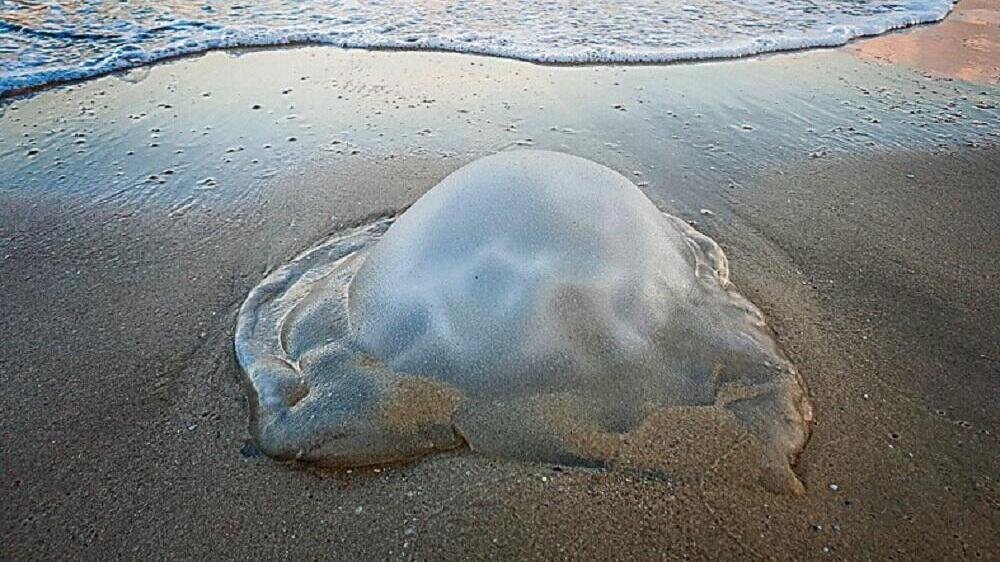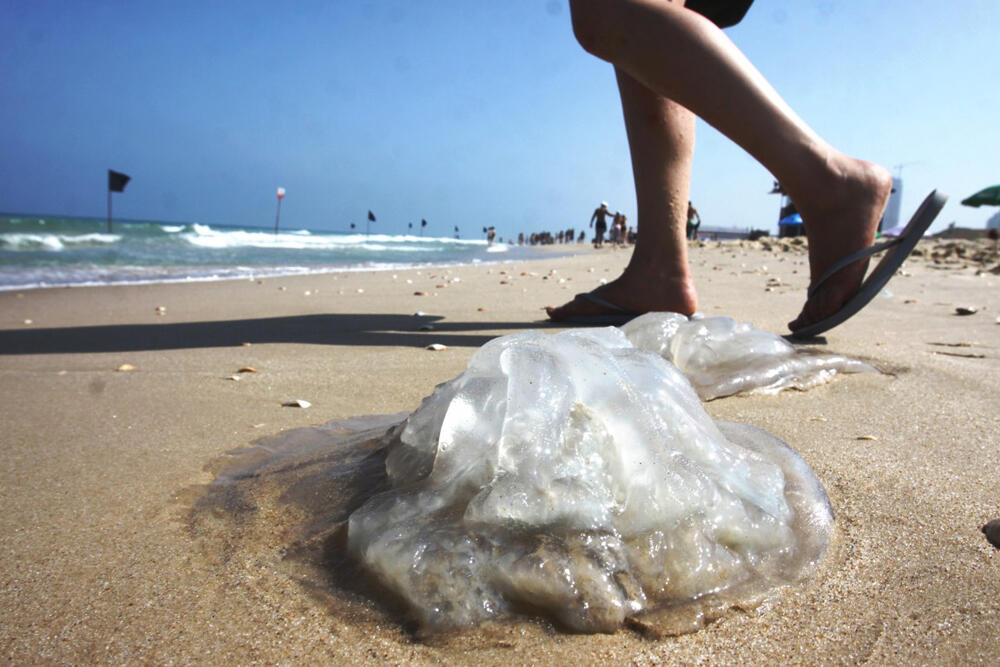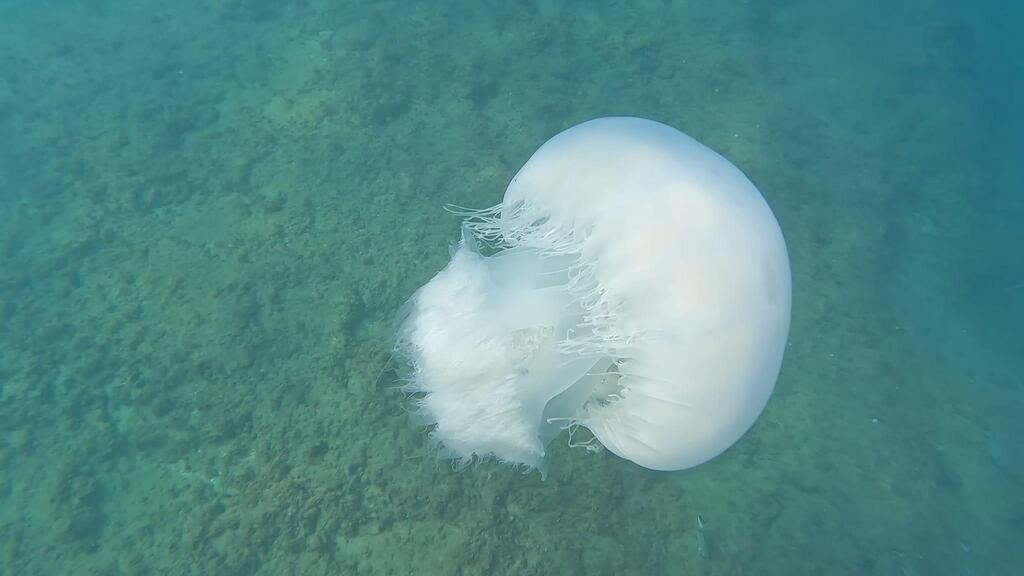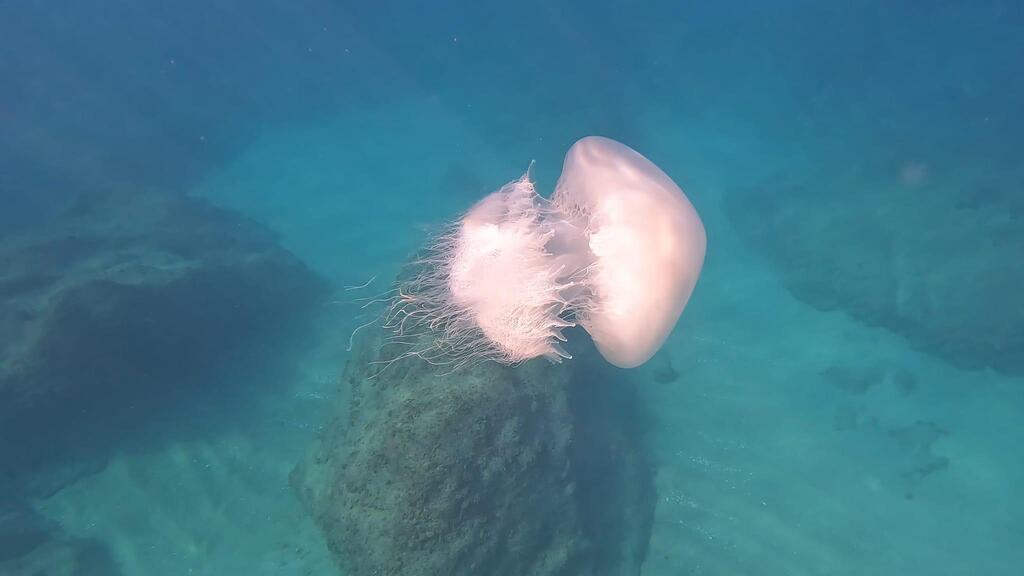Getting your Trinity Audio player ready...
Jellyfish swarm in a beach near Haifa
(Video: Roten Sade, Nature and Parks Authority)
Contrary to previous years, when swarms of jellyfish at this season would be filling up Israel’s beaches, the waters are almost completely free of jellyfish. According to estimates by researchers from Haifa University, this phenomenon could continue well into the end of summer and provide a sting-free beach experience.
More Stories:
"Based on previous years, where jellyfish arrived late, and we had small summer swarms, it’s also possible that we’ll have a similar phenomenon this year," according to Dr. Dor Edelist, from Haifa University’s Marine Studies Institute.
“That is, we won’t experience a large influx of jellyfish,” he added. “We say this cautiously, and of course reality can still change, but based on previous cases this is a reasonable estimation at this moment."
Dr. Edelist and Professor Dror Angel, also from Haifa University’s Marine Studies Institute, who established a website for reporting jellyfish sightings on Israeli beaches, say that most of the reports indicate that no jellyfish were located.
"In previous years we received reports from yacht owners and divers located in the heart of the sea, informing us that the jellyfish were on their way. For now, they are reporting that the sea is free of jellyfish," according to Angel.
Dr. Gur Mizrahi from Haifa University’s Leon H. Charney School of Marine Sciences also paints a similar picture, this time from a bird's-eye view.
In a study led by Dr. Yoav Lehahn from the School of Marine Sciences, researchers are accustomed to identifying jellyfish swarms from planes, and then sailing to the swarm to study the jellyfish.
4 View gallery


A change in ocean currents may have swept the jellyfish to other areas
(Photo: Shutterstock)
Dr. Mizrachi flew himself earlier this week, but the saw no evidence of any large jellyfish swarms. "The area we surveyed from the air was very wide. We flew at a distance of 6 miles from the coastline, along all the beaches, and no jellyfish swarms were observed,” he said.
“We saw only a few jellyfish that may have remained in the area from the winter and spring seasons," said Dr. Mizrachi, who also believes that this summer will be relatively jellyfish-free.
So why aren't the jellyfish coming to Israel? Although researchers gather more and more information about jellyfish each year, much remains unknown. One possibility is a change in ocean currents that may have swept the jellyfish to other areas.
However, according to the researchers, they aren’t aware of reports of jellyfish swarms in other areas where they could have arrived due to changes in ocean currents.
Additionally, the northern current, which could have swept the jellyfish to local shores and even more distant areas, was weak this year, so the currents could be a part of the reason for the phenomenon.
Most researchers agree that climate change caused the Mediterranean Sea to warm up more slowly this year, resulting in an additional two weeks that the jellyfish polyps remained in the comfortable temperature to develop and mature.
In light of this, Angel and Edelist's initial estimation was that the jellyfish would just be delayed for a similar amount of time. However, time passed, and the jellyfish failed to catch up.
So what happened after all? "We still believe that the jellyfish’s proliferation process did occur with a delay of about two to three weeks. However, when they did mature, another factor may have come into play, such as a predator that eats the small jellyfish. Of course, other things may have happened because the ocean is a complex and intricate system," said Angel.
In recent years, researchers have identified several similar phenomena in specific summers, such as in 2016, 2018 and 2021. Based on what occurred in those years, they expect to see this year also become one with few jellyfish reaching Israel.
From their perspective, this is good news for Israelis who enjoy the beach, but they still emphasize that these are educated guesses and, considering the complexity of the marine system, this can still change.
"A jellyfish-free summer is undoubtedly excellent news for those heading to the beach, but if someone thinks this is the 'end of jellyfish,' they’re mistaken,” Angel said.
“What happened this year doesn’t indicate anything about the population of jellyfish on the seabed, while they’re still developing. Most likely, the polyps are still here, waiting for suitable conditions to mature and head into the sea. So as far as we know now, jellyfish aren’t disappearing. This year is just a minor setback for them," he added.







